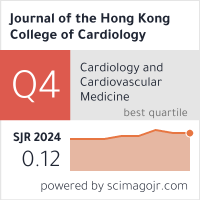Abstract
Background: Limited data exist on the role of chronic hyperglycemia-related cardiac autonomic dysfunction in incident heart failure (HF). We investigated the relations of resting heart rate (HR) and PR interval with chronic hyperglycemia, and effects on new-onset HF.
Methods: We prospectively studied 550 patients with prior coronary disease, ischemic stroke and/ or type 2 diabetes. Incident HF was ascertained. Heart rate-PR interval dissociation was defined as counter-physiological co-occurrence of increased PR interval (>mean; 173.3ms) and increased resting HR (>mean; 64.4 beats/min).
Results: Over 63 ±11 months, 6.7% patients developed new-onset HF. Resting HR³75bpm was independently predictive of new-onset HF (HR=3.35 [95%CI: 1.24 - 9.04], P=0.017). Furthermore, baseline HR was associated with HbA1c (R=0.11, P=0.012). At univariable and multivariable analyses, HbA1c remained independently associated with resting HR³75 bpm (OR=1.18, 95%CI [1.00-1.40], P=0.046). Moreover, the normal inverse relation between PR interval and resting HR is lost in this group of high-risk cardiac patients (R=-0.03, P=0.46). Heart rate-PR interval dissociation was significantly associated with HbA1c>7 (28% versus 17%, P=0.006).
Conclusion: Chronic hyperglycemia is associated with elevated resting HR and counter-physiological dissociation of HR and PR interval, and that such elevated resting HR is a predictor of new-onset HF in cardiovascular patients with prevailing diabetes.
Recommended Citation
Yap-Hang Chan, Bernard Man-Yung Cheung, Hung-Fat Tse, Indicators of Cardiac Autonomic Dysfunction Associated with Chronic Hyperglycemia: Implications on Vascular Surrogates and Heart Failure Journal of the Hong Kong College of Cardiology 2022;29(3):116-123 https://doi.org/10.55503/2790-6744.1487
Creative Commons License

This work is licensed under a Creative Commons Attribution-Noncommercial-No Derivative Works 4.0 License.



